英语一般现在时练习题及答案
英语一般现在时题20套(带答案)及解析
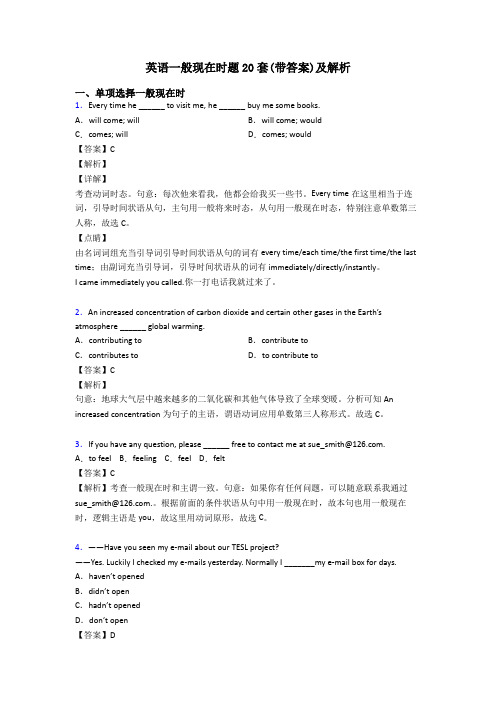
【答案】B
【解析】
试题分析:考查祈使句。本文属祈使句。带有命令的口气,相当于“All of you , please gather at the school gate!”所以选B。所有人到学校门口集合,我们马上要出发了。
考点:考查祈使句
考点:考查动词的时态。
16.You’d better write down her address before you ________ it.
A.forgetB.are forgetting
C.forgotD.will forget
【答案】A
【解析】
试题分析:考查动词的时态。句意:趁你还没有忘记,最好把电话号码记下来。在时间状语从句、条件状语从句和让步状语从句中,用一般现在时代替将来时,故选A项
A.have told; washB.have been told; wash
C.was told; washedD.have been told; are washed
【答案】B
【解析】
考察时态。根据题意,我想买那种衣服,因为有人告诉过我他们洗起来不错。可知从句内容为过去已经完成的动作,故用过去完成时态。他们洗起来不错则是一个客观存在的事实,过去存在,现在及将来都会存在,故用一般现在时态。选B。
3.If you have any question, please ______ free to contact me at sue_smith@.
A.to feel B.feeling C.feel D.felt
【答案】C
【解析】考查一般现在时和主谓一致。句意:如果你有任何问题,可以随意联系我通过sue_smith@.。根据前面的条件状语从句中用一般现在时,故本句也用一般现在时,逻辑主语是you,故这里用动词原形,故选C。
(英语)英语一般现在时题20套(带答案)
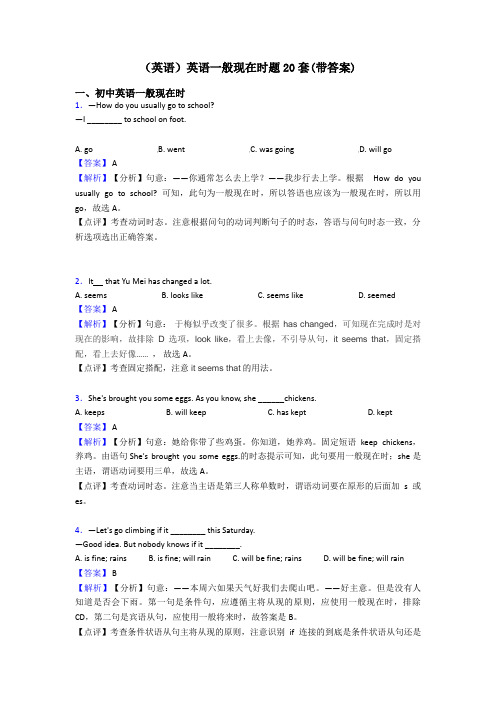
(英语)英语一般现在时题20套(带答案)一、初中英语一般现在时1.—How do you usually go to school?—I ________ to school on foot.A. goB. wentC. was goingD. will go【答案】 A【解析】【分析】句意:——你通常怎么去上学?——我步行去上学。
根据How do you usually go to school? 可知,此句为一般现在时,所以答语也应该为一般现在时,所以用go,故选A。
【点评】考查动词时态。
注意根据问句的动词判断句子的时态,答语与问句时态一致,分析选项选出正确答案。
2.It that Yu Mei has changed a lot.A. seemsB. looks likeC. seems likeD. seemed【答案】 A【解析】【分析】句意:于梅似乎改变了很多。
根据has changed,可知现在完成时是对现在的影响,故排除D选项,look like,看上去像,不引导从句,it seems that,固定搭配,看上去好像……,故选A。
【点评】考查固定搭配,注意it seems that的用法。
3.She's brought you some eggs. As you know, she ______chickens.A. keepsB. will keepC. has keptD. kept【答案】 A【解析】【分析】句意:她给你带了些鸡蛋。
你知道,她养鸡。
固定短语keep chickens,养鸡。
由语句She's brought you some eggs.的时态提示可知,此句要用一般现在时;she是主语,谓语动词要用三单,故选A。
【点评】考查动词时态。
注意当主语是第三人称单数时,谓语动词要在原形的后面加s或es。
4.—Let's go climbing if it ________ this Saturday.—Good idea. But nobody knows if it ________.A. is fine; rainsB. is fine; will rainC. will be fine; rainsD. will be fine; will rain【答案】 B【解析】【分析】句意:——本周六如果天气好我们去爬山吧。
英语一般现在时题20套(带答案)含解析
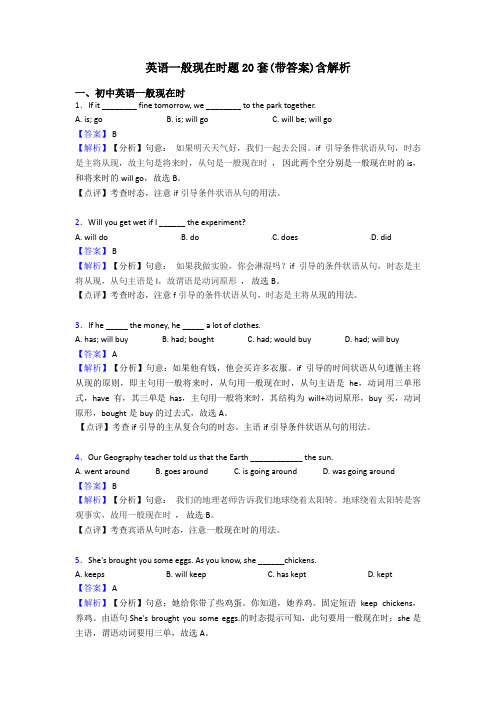
英语一般现在时题20套(带答案)含解析一、初中英语一般现在时1.If it ________ fine tomorrow, we ________ to the park together.A. is; goB. is; will goC. will be; will go【答案】 B【解析】【分析】句意:如果明天天气好,我们一起去公园。
if 引导条件状语从句,时态是主将从现,故主句是将来时,从句是一般现在时,因此两个空分别是一般现在时的is,和将来时的will go,故选B。
【点评】考查时态,注意if引导条件状语从句的用法。
2.Will you get wet if I ______ the experiment?A. will doB. doC. doesD. did【答案】 B【解析】【分析】句意:如果我做实验,你会淋湿吗?if引导的条件状语从句,时态是主将从现,从句主语是 I,故谓语是动词原形,故选B。
【点评】考查时态,注意f引导的条件状语从句,时态是主将从现的用法。
3.If he _____ the money, he _____ a lot of clothes.A. has; will buyB. had; boughtC. had; would buyD. had; will buy【答案】 A【解析】【分析】句意:如果他有钱,他会买许多衣服。
if引导的时间状语从句遵循主将从现的原则,即主句用一般将来时,从句用一般现在时,从句主语是he,动词用三单形式,have有,其三单是has,主句用一般将来时,其结构为will+动词原形,buy买,动词原形,bought是buy的过去式,故选A。
【点评】考查if引导的主从复合句的时态。
主语if引导条件状语从句的用法。
4.Our Geography teacher told us that the Earth ____________ the sun.A. went aroundB. goes aroundC. is going aroundD. was going around【答案】 B【解析】【分析】句意:我们的地理老师告诉我们地球绕着太阳转。
英语一般现在时试题(有答案和解析)

英语一般现在时试题(有答案和解析)一、初中英语一般现在时1.I often _______.She is very kind.A. miss Mr. LiuB. miss Miss LiuC. am missing Miss LiuD. am missing Mr. Liu【答案】B【解析】【分析】句意:我经常想念刘老师。
她很和蔼。
根据句中的often可知应使用一般现在时态,又有下文中的she可知应为女性,故选B。
【点评】考查一般现在时态。
2.I think joining the English club ________ the best way to improve your English.A. areB. wasC. isD. were【答案】 C【解析】【分析】句意:我认为加入英语俱乐部是提高英语水平的最好方法。
描述客观事实用一般现在时,主语是动名词joining,谓语是单三式,故be用is,故选C。
【点评】考查时态,注意主谓一致的用法。
3.She _____ out alone at night.A. dare not to goB. dares not goC. doesn't dare to goD. doesn't dares go【答案】 C【解析】【分析】句意:晚上她不敢一个人出去。
dare可以作情态动词也可以作行为动词,作情态动词时,后面直接跟动词原形,没有人称与数的变化,构成否定时直接在dare 后加not,作行为动词时后跟动词不定式,构成否定需要助动词,故答案是C。
【点评】考查dare的用法,注意dare做情态动词和行为动词的用法上的区别。
4.If he _____ the money, he _____ a lot of clothes.A. has; will buyB. had; boughtC. had; would buyD. had; will buy【答案】 A【解析】【分析】句意:如果他有钱,他会买许多衣服。
英语一般现在时题20套(带答案)及解析
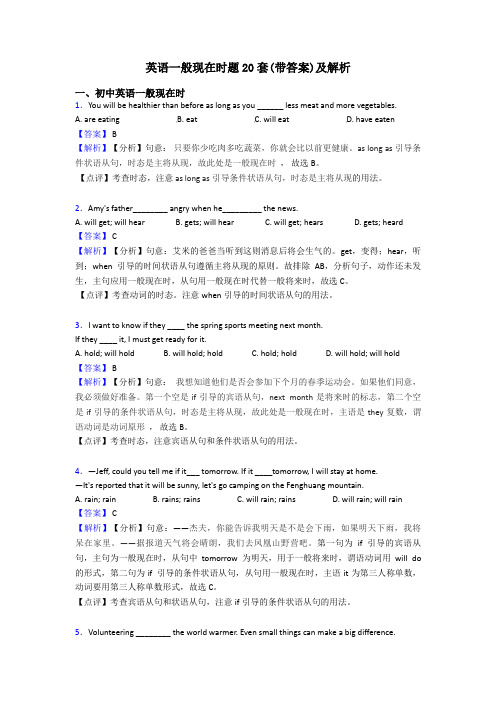
英语一般现在时题20套(带答案)及解析一、初中英语一般现在时1.You will be healthier than before as long as you ______ less meat and more vegetables.A. are eatingB. eatC. will eatD. have eaten【答案】 B【解析】【分析】句意:只要你少吃肉多吃蔬菜,你就会比以前更健康。
as long as引导条件状语从句,时态是主将从现,故此处是一般现在时,故选B。
【点评】考查时态,注意as long as引导条件状语从句,时态是主将从现的用法。
2.Amy's father________ angry when he_________ the news.A. will get; will hearB. gets; will hearC. will get; hearsD. gets; heard【答案】 C【解析】【分析】句意:艾米的爸爸当听到这则消息后将会生气的。
get,变得;hear,听到;when引导的时间状语从句遵循主将从现的原则。
故排除AB,分析句子,动作还未发生,主句应用一般现在时,从句用一般现在时代替一般将来时,故选C。
【点评】考查动词的时态。
注意when引导的时间状语从句的用法。
3.I want to know if they ____ the spring sports meeting next month.If they ____ it, I must get ready for it.A. hold; will holdB. will hold; holdC. hold; holdD. will hold; will hold【答案】 B【解析】【分析】句意:我想知道他们是否会参加下个月的春季运动会。
如果他们同意,我必须做好准备。
第一个空是if引导的宾语从句,next month是将来时的标志,第二个空是if引导的条件状语从句,时态是主将从现,故此处是一般现在时,主语是they复数,谓语动词是动词原形,故选B。
初中英语50题及解答(一般现在时)

初中英语50题及解答(一般现在时)1)She _____ the piano every day.A. playB. playsC. playingD. played2)He _____ not like bananas.A. doB. doesC. doingD. did3)The sun _____ in the east.A. riseB. risesC. risingD. rose4)They usually _____ to school by bus.A. goB. goesC. goingD. went5)My mother _____ dinner at this time.A. cookB. cooksC. cookingD. cooked6)I _____ my homework every evening.A. doB. doesC. doingD. did7)Birds _____ in the sky.A. flyB. fliesC. flyingD. flew8)Jenny _____ her teeth twice a day.A. brushB. brushesC. brushingD. brushed9)We _____ English every morning.A. studyB. studiesC. studyingD. studied10) He _____ to the radio in his free time.A. listenB. listensC. listeningD. listened11)My father _____ coffee every morning.A. drinkB. drinksC. drinkingD. drank12)I _____ to school every day.A. walkB. walksC. walkingD. walked13)The teacher _____ in the classroom.A. isB. areC. amD. be14)We _____ soccer every weekend.A. playB. playsC. playingD. played15)She _____ her homework after school.A. doB. doesC. doingD. done16)Cats _____ mice.A. chaseB. chasesC. chasingD. chased17)They _____ to bed early.A. goB. goesC. goingD. went18)He _____ the newspaper every day.A. readB. readsC. readingD. readed19)My sister _____ a shower in the morning.A. takeB. takesC. takingD. took20)I _____ TV in the evening.A. watchB. watchesC. watchingD. watched21)He always _____ his homework after dinner.A. finishesB. finishC. finishingD. finished22)My friends _____ basketball every weekend.A. playsB. playC. playingD. played23)The sun _____ in the east.A. riseB. risesC. risingD. rose24)Birds _____ in the sky.A. flyB. fliesC. flyingD. flew25)I _____ breakfast at 7am every day.A. haveB. hasC. havingD. had26)She _____ to music in her free time.A. listensB. listenC. listeningD. listened27)My parents _____ dinner at home every night.A. cooksB. cookC. cookingD. cooked28)He _____ English very well.A. speaksB. speakC. speakingD. spoke29)The dog _____ its tail when it’s happy.A. wagsB. wagC. waggingD. wagged30)We _____ to school by bus every day.A. goesB. goC. goingD. went31)My sister _____ a book every week.A. readB. readsC. readingD. readed32)She _____ a cup of coffee every morning.A. drinksB. drinkC. drinkingD. drunk33)Every day, the sun _____ in the east.A. riseB. risesC. risingD. rose34)I _____ to the gym three times a week.A. goesB. goC. goingD. went35)My parents _____ to work by car.A. goesB. goC. goingD. went36)He _____ to school at 8 am every day.A. leavesB. leaveC. leavingD. left37)The library _____ at 9 am every day.A. opensB. openC. openingD. opened38)She _____ her teeth before bed every night.A. brushesB. brushC. brushingD. brushed39)It _____ in winter here.A. snowsB. snowC. snowingD. snowed40)The flowers _____ beautiful in spring.A. looksB. lookC. lookingD. looked41)My father always _____ to work at 7 am.A. goB. goesC. goingD. went42)Lucy and her brother _____ to school together every day.A. walksB. walkC. walkingD. walked43)The train _____ at 9 o’clock every morning.A. leavesB. leaveC. leavingD. left44)I usually _____ dinner at home.A. eatsB. eatC. eatingD. ate45)The cat _____ milk every day.A. drinksB. drinkC. drinkingD. drank46)We _____ basketball every weekend.A. playsB. playC. playingD. played47)The supermarket _____ at 8 am every day.A. opensB. openC. openingD. opened48)She always _____ her homework after dinner.A. doesB. doC. doingD. did49)My brother _____ the guitar every evening.A. playsB. playC. playingD. played50)The birds _____ south for the winter.A. fliesB. flyC. flyingD. flew答案及解析:1. 答案:B解析:根据一般现在时的规则,第三人称单数后的动词需要加s。
英语一般现在时题20套(带答案)含解析
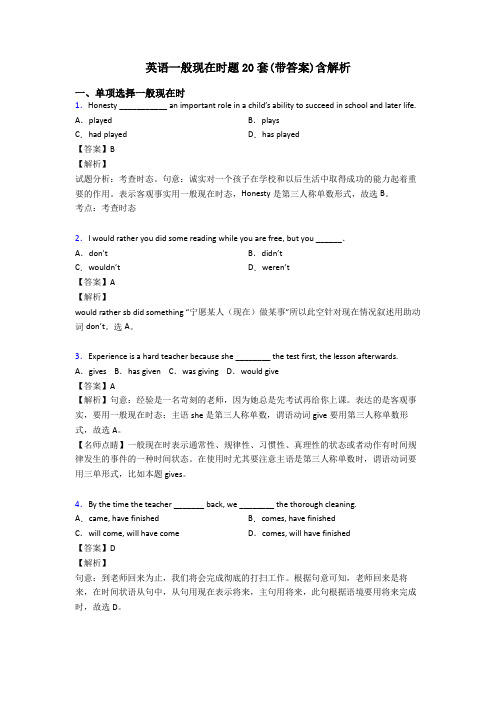
英语中有些动词在形式上是主动的,含义上却是被动的,但是这些动词这样用时又不是不及物动词。常见的这类动词有:sell, wash, cook, wear, rite, look, open, shut, translate, read, last, cut等。
—Would you like a piece of this kind of cloth?
英语一般现在时题20套(带答案)含解析
一、单项选择一般现在时
1.Honesty ___________ an important role in a child’s ability to succeed in school and later life.
A.playedB.plays
C.had playedD.has played
A.finding; reflectingB.found; reflected
C.found; to reflectD.found; reflect
【答案】D
【解析】
考察非谓语动词。过去分词做定语表示被动的,发生过的动作。句意:在空气中许多被发现的气体实际上反映了从地球表面扩散又回到地球的热能。前文动词为gases的定语,发生过的用过去分词,下文从此为句子谓语。叙述一个客观存在的事实,用一般现在时态,gases为复数,故动词用原形,选D。
说明这种纸易撕烂,是主语的性质。本题即考查这种笔所具备的特点,故用现在时的主动语态。A为一般现在时的被动语态,B为现在进行时,C一般过去时。
考点:考查时态语态的用法。
7.He’s been informed that he ________ for the scholarship because of his academic background.
六年级英语一般现在时单选题30题(带答案)
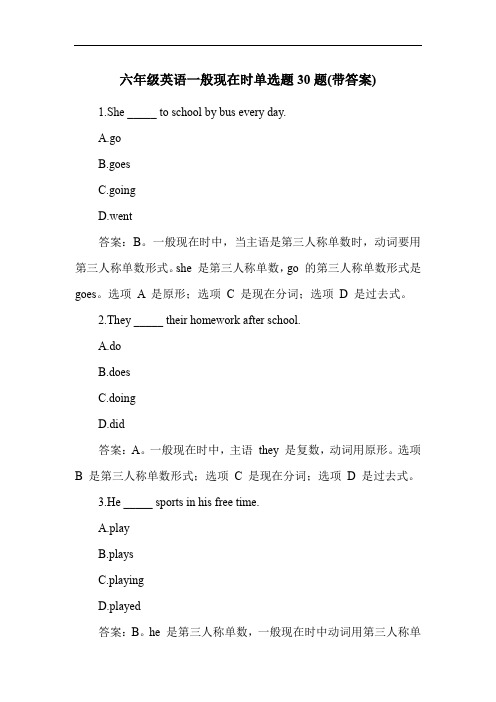
六年级英语一般现在时单选题30题(带答案)1.She _____ to school by bus every day.A.goB.goesC.goingD.went答案:B。
一般现在时中,当主语是第三人称单数时,动词要用第三人称单数形式。
she 是第三人称单数,go 的第三人称单数形式是goes。
选项A 是原形;选项C 是现在分词;选项D 是过去式。
2.They _____ their homework after school.A.doB.doesC.doingD.did答案:A。
一般现在时中,主语they 是复数,动词用原形。
选项B 是第三人称单数形式;选项C 是现在分词;选项D 是过去式。
3.He _____ sports in his free time.A.playB.playsC.playingD.played答案:B。
he 是第三人称单数,一般现在时中动词用第三人称单数形式plays。
选项A 是原形;选项C 是现在分词;选项D 是过去式。
4.We _____ an art class on Tuesdays.A.haveB.hasC.havingD.had答案:A。
we 是复数,一般现在时中动词用原形。
选项B 是第三人称单数形式;选项C 是现在分词;选项D 是过去式。
5.My sister _____ books in the evening.A.readB.readsC.readingD.readed答案:B。
my sister 是第三人称单数,一般现在时中动词用第三人称单数形式reads。
选项 A 是原形;选项C 是现在分词;选项D 是错误形式。
6.I _____ to music every day.A.listenB.listensC.listeningD.listened答案:A。
I 是第一人称,一般现在时中动词用原形。
选项B 是第三人称单数形式;选项C 是现在分词;选项D 是过去式。
(英语)英语一般现在时题20套(带答案)及解析
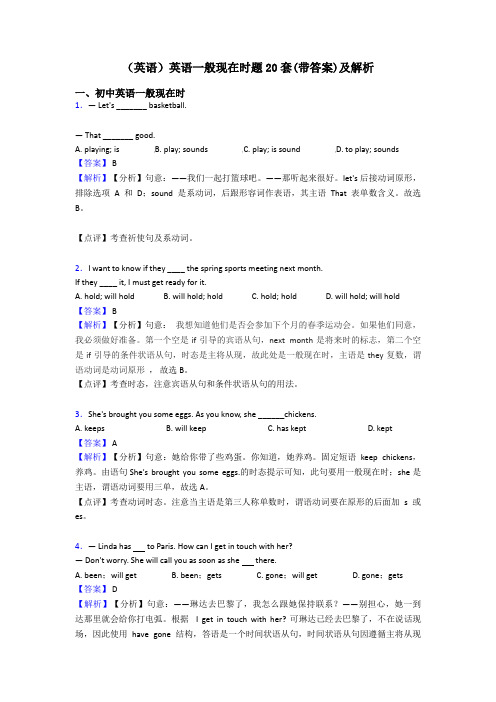
(英语)英语一般现在时题20套(带答案)及解析一、初中英语一般现在时1.— Let's _______ basketball.— That _______ good.A. playing; isB. play; soundsC. play; is soundD. to play; sounds【答案】 B【解析】【分析】句意:——我们一起打篮球吧。
——那听起来很好。
let's后接动词原形,排除选项A和D;sound是系动词,后跟形容词作表语,其主语That表单数含义。
故选B。
【点评】考查祈使句及系动词。
2.I want to know if they ____ the spring sports meeting next month.If they ____ it, I must get ready for it.A. hold; will holdB. will hold; holdC. hold; holdD. will hold; will hold【答案】 B【解析】【分析】句意:我想知道他们是否会参加下个月的春季运动会。
如果他们同意,我必须做好准备。
第一个空是if引导的宾语从句,next month是将来时的标志,第二个空是if引导的条件状语从句,时态是主将从现,故此处是一般现在时,主语是they复数,谓语动词是动词原形,故选B。
【点评】考查时态,注意宾语从句和条件状语从句的用法。
3.She's brought you some eggs. As you know, she ______chickens.A. keepsB. will keepC. has keptD. kept【答案】 A【解析】【分析】句意:她给你带了些鸡蛋。
你知道,她养鸡。
固定短语keep chickens,养鸡。
由语句She's brought you some eggs.的时态提示可知,此句要用一般现在时;she是主语,谓语动词要用三单,故选A。
(英语)英语一般现在时题20套(带答案)及解析
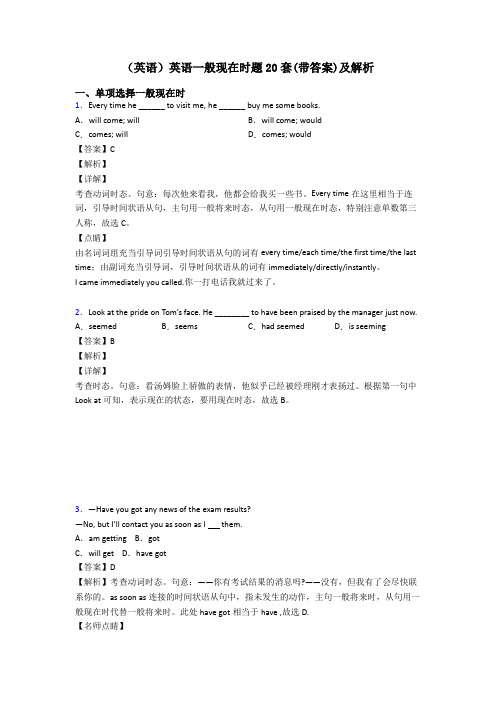
A.is collectingB.collects
C.collectedD.was collecting
【答案】B
【解析】
试题分析:考查时态。句意:Frank在他的空闲时间收集邮票。这是他的爱好。根据“It’s his hobby”可知,这是Frank经常做的事情。用一般现在时,故选B。
A.am getting B.got
C.will get D.have got
【答案】D
【解析】考查动词时态。句意:——你有考试结果的消息吗?——没有,但我有了会尽快联系你的。as soon as连接的时间状语从句中,指未发生的动作,主句一般将来时,从句用一般现在时代替一般将来时。此处have got相当于have ,故选D.
A.are droppedB.drop
C.are being droppedD.have dropped
【答案】B
【解析】
试题分析:句意:山里的气温晚上下降得厉害,所以出门前穿上一些暖和的衣服。山里的气温到晚上骤降是自然状况,应该用一般现在时的主动语态。故选B。
考点:考查谓语动词的时态和语态。
17.you read the instructions closely, you would know what I.
8.Many gasesin the atmosphere actuallyheat energy that escapes from the Earth’s surface back to the earth.
A.finding; reflectingB.found; reflected
【英语】英语一般现在时专项训练100(附答案)
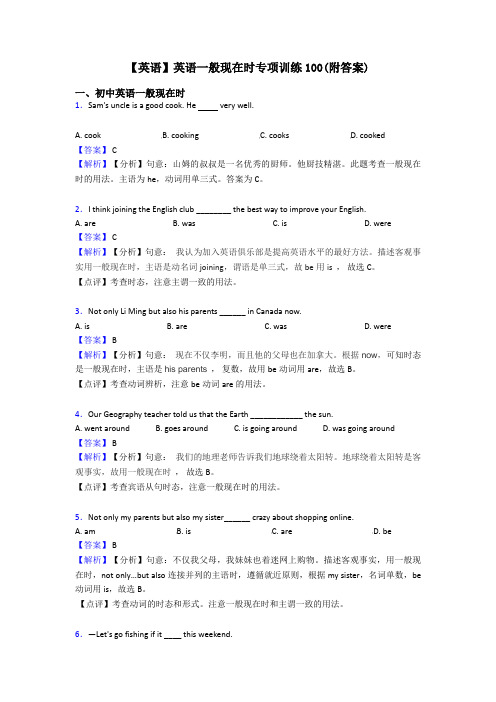
【英语】英语一般现在时专项训练100(附答案)一、初中英语一般现在时1.Sam's uncle is a good cook. He very well.A. cookB. cookingC. cooksD. cooked【答案】 C【解析】【分析】句意:山姆的叔叔是一名优秀的厨师。
他厨技精湛。
此题考查一般现在时的用法。
主语为he,动词用单三式。
答案为C。
2.I think joining the English club ________ the best way to improve your English.A. areB. wasC. isD. were【答案】 C【解析】【分析】句意:我认为加入英语俱乐部是提高英语水平的最好方法。
描述客观事实用一般现在时,主语是动名词joining,谓语是单三式,故be用is,故选C。
【点评】考查时态,注意主谓一致的用法。
3.Not only Li Ming but also his parents ______ in Canada now.A. isB. areC. wasD. were【答案】 B【解析】【分析】句意:现在不仅李明,而且他的父母也在加拿大。
根据now,可知时态是一般现在时,主语是his parents,复数,故用be动词用are,故选B。
【点评】考查动词辨析,注意be动词are的用法。
4.Our Geography teacher told us that the Earth ____________ the sun.A. went aroundB. goes aroundC. is going aroundD. was going around【答案】 B【解析】【分析】句意:我们的地理老师告诉我们地球绕着太阳转。
地球绕着太阳转是客观事实,故用一般现在时,故选B。
【点评】考查宾语从句时态,注意一般现在时的用法。
5.Not only my parents but also my sister______ crazy about shopping online.A. amB. isC. areD. be【答案】 B【解析】【分析】句意:不仅我父母,我妹妹也着迷网上购物。
(英语)英语一般现在时题20套(带答案)
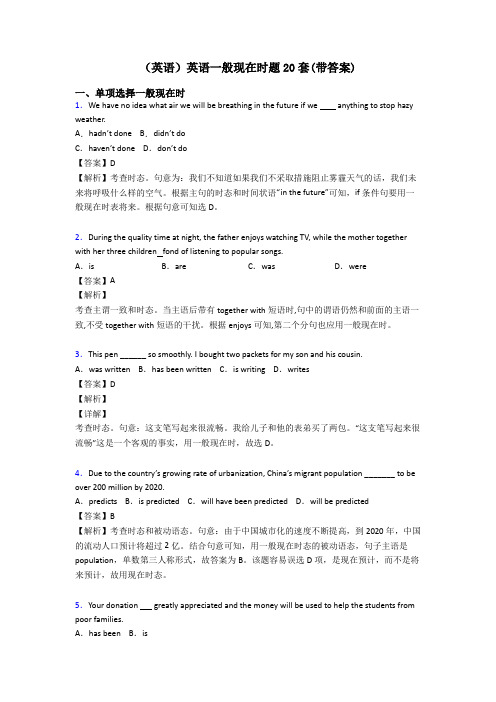
16.That’s why I help brighten people’s days. If you ________, who’s to say that another person will?
A.didn’tB.don’t
C.weren’tD.haven’t
【答案】B
【解析】
【详解】
A.isB.areC.wasD.were
【答案】A
【解析】
考查主谓一致和时态。当主语后带有together with短语时,句中的谓语仍然和前面的主语一致,不受together with短语的干扰。根据enjoys可知,第二个分句也应用一般现在时。
3.This pen ______ so smoothly. I bought two packets for my son and his cousin.
【答案】D
【解析】
【详解】
考查if条件句中的时态。句意:如果他不做运动,他就不会健康。If条件句,如果主句用一般将来时态,则从句用一般现在时态,且句子主语是he,单数第三人称,故选D。
10.Still many Senior Three students haven't realized reading English newspapers _______of great help to their English study.
A.was written B.has been written C.is writing D.writes
【答案】D
【解析】
【详解】
考查时态。句意:这支笔写起来很流畅。我给儿子和他的表弟买了两包。“这支笔写起来很流畅”这是一个客观的事实,用一般现在时,故选D。
英语一般现在时题20套(带答案)
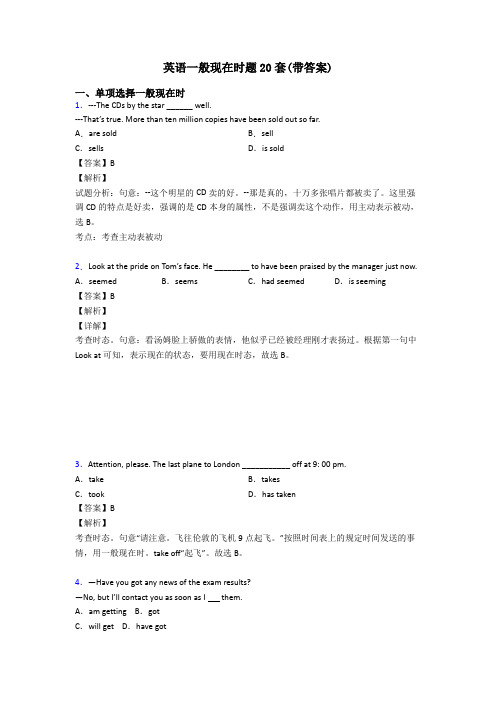
英语一般现在时题20套(带答案)一、单项选择一般现在时1.---The CDs by the star ______ well.---That’s true. More than ten million copies have been sold out so far.A.are sold B.sellC.sells D.is sold【答案】B【解析】试题分析:句意:--这个明星的CD卖的好。
--那是真的,十万多张唱片都被卖了。
这里强调CD的特点是好卖,强调的是CD本身的属性,不是强调卖这个动作,用主动表示被动,选B。
考点:考查主动表被动2.Look at the pride on Tom’s face. He ________ to have been praised by the manager just now. A.seemed B.seems C.had seemed D.is seeming【答案】B【解析】【详解】考查时态。
句意:看汤姆脸上骄傲的表情,他似乎已经被经理刚才表扬过。
根据第一句中Look at可知,表示现在的状态,要用现在时态,故选B。
3.Attention, please. The last plane to London ___________ off at 9: 00 pm.A.take B.takesC.took D.has taken【答案】B【解析】考查时态。
句意“请注意。
飞往伦敦的飞机9点起飞。
”按照时间表上的规定时间发送的事情,用一般现在时。
take off“起飞”。
故选B。
4.—Have you got any news of the exam results?—No, but I’ll contact you as soon as I them.A.am getting B.gotC.will get D.have got【答案】D【解析】考查动词时态。
英语一般现在时题20套(带答案)含解析
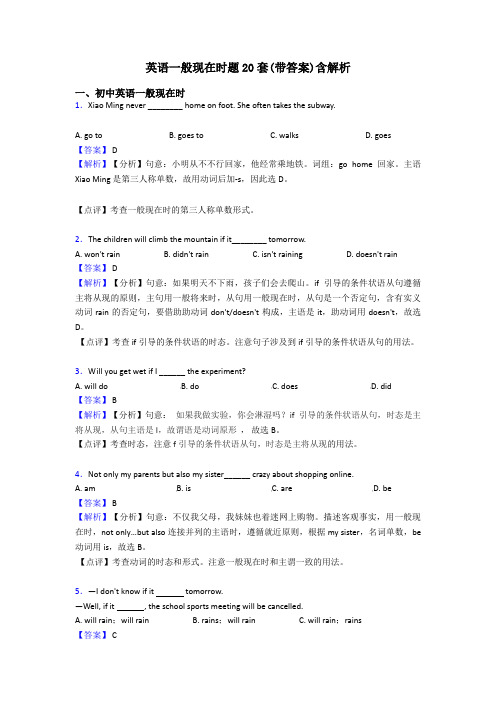
英语一般现在时题20套(带答案)含解析一、初中英语一般现在时1.Xiao Ming never ________ home on foot. She often takes the subway.A. go toB. goes toC. walksD. goes【答案】 D【解析】【分析】句意:小明从不不行回家,他经常乘地铁。
词组:go home回家。
主语Xiao Ming 是第三人称单数,故用动词后加-s,因此选D。
【点评】考查一般现在时的第三人称单数形式。
2.The children will climb the mountain if it________ tomorrow.A. won't rainB. didn't rainC. isn't rainingD. doesn't rain【答案】 D【解析】【分析】句意:如果明天不下雨,孩子们会去爬山。
if 引导的条件状语从句遵循主将从现的原则,主句用一般将来时,从句用一般现在时,从句是一个否定句,含有实义动词rain的否定句,要借助助动词don't/doesn't构成,主语是it,助动词用doesn't,故选D。
【点评】考查if引导的条件状语的时态。
注意句子涉及到if引导的条件状语从句的用法。
3.Will you get wet if I ______ the experiment?A. will doB. doC. doesD. did【答案】 B【解析】【分析】句意:如果我做实验,你会淋湿吗?if引导的条件状语从句,时态是主将从现,从句主语是 I,故谓语是动词原形,故选B。
【点评】考查时态,注意f引导的条件状语从句,时态是主将从现的用法。
4.Not only my parents but also my sister______ crazy about shopping online.A. amB. isC. areD. be【答案】 B【解析】【分析】句意:不仅我父母,我妹妹也着迷网上购物。
六年级英语一般现在时单选题30题及答案

六年级英语一般现在时单选题30题及答案1.She ______ to school by bus every day.A.goB.goesC.goingD.went答案:B。
“every day”表明是一般现在时,主语she 是第三人称单数,动词要用goes。
A 选项go 用于主语不是第三人称单数的情况;C 选项going 不能单独作谓语;D 选项went 是过去式,不符合题意。
2.He ______ football on weekends.A.playB.playsC.playingD.played答案:B。
“on weekends”提示一般现在时,主语he 是第三人称单数,动词用plays。
A 选项play 用于主语不是第三人称单数时;C 选项playing 不能单独作谓语;D 选项played 是过去式。
3.They ______ their homework after school.A.doB.doesC.doing答案:A。
主语they 不是第三人称单数,一般现在时用do。
B 选项does 用于第三人称单数;C 选项doing 不能单独作谓语;D 选项did 是过去式。
4.My mother ______ cooking in the kitchen.A.likeB.likesC.likingD.liked答案:B。
主语my mother 是第三人称单数,一般现在时动词用likes。
A 选项like 用于主语不是第三人称单数时;C 选项liking 不能单独作谓语;D 选项liked 是过去式。
5.We ______ books in the library.A.readB.readsC.readingD.readed答案:A。
主语we 不是第三人称单数,一般现在时用read。
B 选项reads 用于第三人称单数;C 选项reading 不能单独作谓语;D 选项readed 错误形式。
【英语】英语一般现在时题20套(带答案)
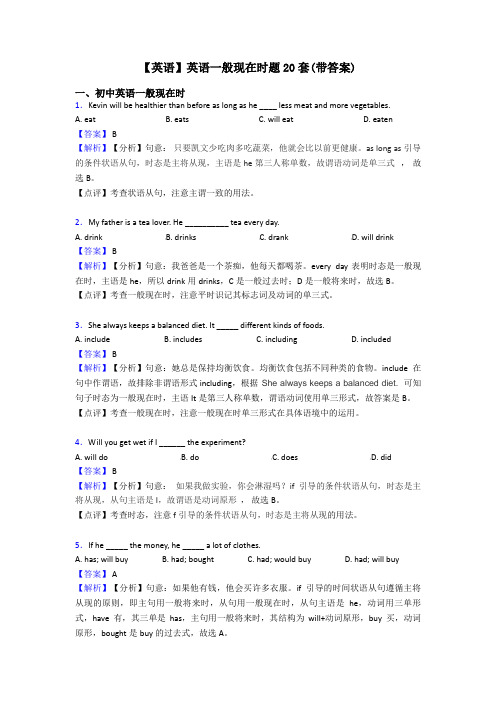
【英语】英语一般现在时题20套(带答案)一、初中英语一般现在时1.Kevin will be healthier than before as long as he ____ less meat and more vegetables.A. eatB. eatsC. will eatD. eaten【答案】 B【解析】【分析】句意:只要凯文少吃肉多吃蔬菜,他就会比以前更健康。
as long as引导的条件状语从句,时态是主将从现,主语是he第三人称单数,故谓语动词是单三式,故选B。
【点评】考查状语从句,注意主谓一致的用法。
2.My father is a tea lover. He __________ tea every day.A. drinkB. drinksC. drankD. will drink【答案】 B【解析】【分析】句意:我爸爸是一个茶痴,他每天都喝茶。
every day表明时态是一般现在时,主语是he,所以drink用drinks,C是一般过去时;D是一般将来时,故选B。
【点评】考查一般现在时,注意平时识记其标志词及动词的单三式。
3.She always keeps a balanced diet. It _____ different kinds of foods.A. includeB. includesC. includingD. included【答案】 B【解析】【分析】句意:她总是保持均衡饮食。
均衡饮食包括不同种类的食物。
include在句中作谓语,故排除非谓语形式including,根据She always keeps a balanced diet.可知句子时态为一般现在时,主语It是第三人称单数,谓语动词使用单三形式,故答案是B。
【点评】考查一般现在时,注意一般现在时单三形式在具体语境中的运用。
4.Will you get wet if I ______ the experiment?A. will doB. doC. doesD. did【答案】 B【解析】【分析】句意:如果我做实验,你会淋湿吗?if引导的条件状语从句,时态是主将从现,从句主语是 I,故谓语是动词原形,故选B。
【英语】英语一般现在时题20套(带答案)

【英语】英语一般现在时题20套(带答案)一、初中英语一般现在时1.Xiao Ming never ________ home on foot. She often takes the subway.A. go toB. goes toC. walksD. goes【答案】 D【解析】【分析】句意:小明从不不行回家,他经常乘地铁。
词组:go home回家。
主语Xiao Ming 是第三人称单数,故用动词后加-s,因此选D。
【点评】考查一般现在时的第三人称单数形式。
2.Not only Li Ming but also his parents ______ in Canada now.A. isB. areC. wasD. were 【答案】 B【解析】【分析】句意:现在不仅李明,而且他的父母也在加拿大。
根据now,可知时态是一般现在时,主语是his parents,复数,故用be动词用are,故选B。
【点评】考查动词辨析,注意be动词are的用法。
3.Our Geography teacher told us that the Earth ____________ the sun.A. went aroundB. goes aroundC. is going aroundD. was going around【答案】 B【解析】【分析】句意:我们的地理老师告诉我们地球绕着太阳转。
地球绕着太阳转是客观事实,故用一般现在时,故选B。
【点评】考查宾语从句时态,注意一般现在时的用法。
4.—Let's go fishing if it ____ this weekend.—But nobody knows if it ____.A. is fine; will rainB. will be rain; rainsC. will be fine; will rainD. is fine; rains 【答案】 A【解析】【分析】句意:——如果本周末天晴,我们一起去钓鱼吧。
英语一般现在时练习题带答案

英语一般现在时练习题带答案一、单选题1.Bill has two basketballs, but I ________.A.don’t have B.don’t C.doesn’t have D.have 2.—Look, the boy there ________ big eyes and short hair.—How cool!A.are B.is C.have D.has3.The bank usually ________ at 5 p.m., and it doesn’t ha ve to stay ________ at weekends.A.closes; opened B.closes; open C.closed; opened D.closed; open 4.The shop near our school _______ at eight in the morning and it _______ for twelve hours a day.A.opens;is opening B.opens; is open C.is open; opens D.is opening; is open5.—________ your mother good at cooking?— Yes, but my sister ________ cook well.A.Does; doesn’t B.Is; isn’t C.Do; don’t D.Is; doesn’t 6.My mother always ________ clothes in the evening, but tomorrow she ________ them in the afternoon.A.washes; washes B.washes; is going to wash C.washed; washedD.is washing; is going to wash7.—Excuse me, could you please wake me up if my friend ________ here?—Of course, but we still don’t know when your friend ________ here.A.will come; comes B.will come; will come C.comes; will comeD.comes; comes8.My grandfather ________ reading after supper every day.A.liked B.is liking C.like D.likes9.Mary ________ listening to the music after school every day.A.enjoy B.enjoys C.is enjoying D.enjoyed 10.Kevin will give less homework to his students if he ________ a teacher.A.will become B.becomes C.become D.became11.If it ________ sunny, we will go for a picnic in the park next Sunday.A.is B.was C.will be D.has been 12.He ________ in his best clothes, ready for his evening out.A.is dressing B.dresses C.is dressed D.dressed13.If it _______ tomorrow, we will go to the farm.A.will not rain B.doesn’t rain C.isn’t raining 14.Sue, remember ________ off the lights when you ________ the living room. A.turning; leaving B.to turn; leave C.turning; left D.to turn; leaving 15.Mary ________ an email now. She often ________ email at night. A.writes; is writing B.is writing; writesC.writes; writes D.is writing; is writing16.I ________ to go shopping now. Can you go with me?A.want B.wants C.to want D.am wanting 17.He doesn’t ________ history because it’s not fun.A.want to learn B.want learn C.want learning D.to want to learn 18.I am waiting for my classmate. If ________, I will go to school by myself. A.she doesn’t come B.s he won’t come C.she will comeD.she is coming19.He found a good ________. He ________ very hard.A.work, works B.work, job C.job, work D.job, works 20.—Staying up late often __________ lots of health problems. You’d better go to bed earlier.— OK, mum. I won’t stay up late next time.A.causes B.is causing C.caused D.was causing 二、用单词的正确形式填空21.— ________(do) your brother like basketball?— Yes, and he also likes soccer.22.—I think the CCTV Spring Festival Gala of 2015 was wonderful.—I ________ (agree) with you. It was boring.23.I’m sorry that I ________ (agree) with you, because your idea is too old. 24.David ________ (need) a pencil box for school.25.His sister usually _________ (take) a shower at 8:00 in the evening. 26.Maria ____________ (learn) English in the evening every day.27.Peter ________ (have) a brother and two sisters.28.It is half past six in the morning. The Blacks often ________ (have) breakfast at this time.29.We are going to visit the Hometown of Xu Xiake if it _______ (not rain) tomorrow.30.The Browns once ______(live) in Australia. But they are now working in the USA.31.David ______ (have) two ping-pong balls.32.In April, it's quite rainy. Sometimes the sudden heavy rain _________ (cause) a lot of problems.33.Jim ______ ( do not) have breakfast at home34.How much _____ (be) the chicken?35.I ________ to go shopping because I think it’s boring. (like)36.My name _______ (be) Sam.37.Edison’s mother ________ (teach)him herself.38.Look! Nancy ________ (have) some beautiful flowers in her hands. 39.—Let’s go for a walk.— ________(sound) great.40.________ (do) your sisters like bananas?三、完成句子41.如果冬天来了,春天还会远吗?If winter ________, can spring be far behind?42.听起来你好像不是发烧。
(完整版)英语一般现在时练习题及答案
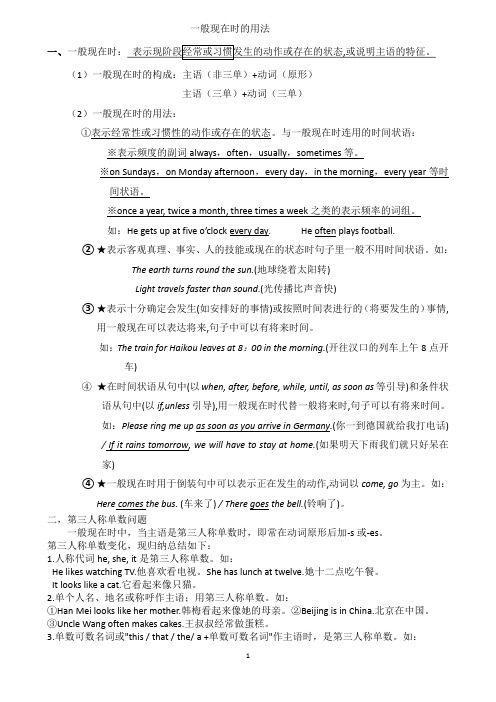
一般现在时的用法一、一般现在时:表示现阶段经常或习惯发生的动作或存在的状态,或说明主语的特征。
(1)一般现在时的构成:主语(非三单)+动词(原形)主语(三单)+动词(三单)(2)一般现在时的用法:①表示经常性或习惯性的动作或存在的状态。
与一般现在时连用的时间状语:※表示频度的副词always,often,usually,sometimes等。
※on Sundays,on Monday afternoon,every day,in the morning,every year等时间状语。
※once a year, twice a month, three times a week之类的表示频率的词组。
如:He gets up at five o’clock every day. He often plays football.②★表示客观真理、事实、人的技能或现在的状态时句子里一般不用时间状语。
如:The earth turns round the sun.(地球绕着太阳转)Light travels faster than sound.(光传播比声音快)③★表示十分确定会发生(如安排好的事情)或按照时间表进行的(将要发生的)事情,用一般现在可以表达将来,句子中可以有将来时间。
如:The train for Haikou leaves at 8:00 in the morning.(开往汉口的列车上午8点开车)④★在时间状语从句中(以when, after, before, while, until, as soon as等引导)和条件状语从句中(以if,unless引导),用一般现在时代替一般将来时,句子可以有将来时间。
如:Please ring me up as soon as you arrive in Germany.(你一到德国就给我打电话)/ If it rains tomorrow, we will have to stay at home.(如果明天下雨我们就只好呆在家)④★一般现在时用于倒装句中可以表示正在发生的动作,动词以come, go为主。
- 1、下载文档前请自行甄别文档内容的完整性,平台不提供额外的编辑、内容补充、找答案等附加服务。
- 2、"仅部分预览"的文档,不可在线预览部分如存在完整性等问题,可反馈申请退款(可完整预览的文档不适用该条件!)。
- 3、如文档侵犯您的权益,请联系客服反馈,我们会尽快为您处理(人工客服工作时间:9:00-18:30)。
一般現在時の用法一、一般現在時:表示現階段經常或習慣發生の動作或存在の狀態,或說明主語の特征。
(1)一般現在時の構成:主語(非三單)+動詞(原形)主語(三單)+動詞(三單)(2)一般現在時の用法:①表示經常性或習慣性の動作或存在の狀態。
與一般現在時連用の時間狀語:※表示頻度の副詞always,often,usually,sometimes等。
※on Sundays,on Monday afternoon,every day,in the morning,every year等時間狀語。
※once a year, twice a month, three times a week之類の表示頻率の詞組。
如:He gets up at five o’clock every day. He often plays football.②★表示客觀真理、事實、人の技能或現在の狀態時句子裏一般不用時間狀語。
如:The earth turns round the sun.(地球繞著太陽轉)Light travels faster than sound.(光傳播比聲音快)③★表示十分確定會發生(如安排好の事情)或按照時間表進行の(將要發生の)事情,用一般現在可以表達將來,句子中可以有將來時間。
如:The train for Haikou leaves at 8:00 in the morning.(開往漢口の列車上午8點開車)④★在時間狀語從句中(以when, after, before, while, until, as soon as等引導)和條件狀語從句中(以if,unless引導),用一般現在時代替一般將來時,句子可以有將來時間。
如:Please ring me up as soon as you arrive in Germany.(你一到德國就給我打電話)/ If it rains tomorrow, we will have to stay at home.(如果明天下雨我們就只好呆在家)④★一般現在時用於倒裝句中可以表示正在發生の動作,動詞以come, go為主。
如:Here comes the bus. (車來了) / There goes the bell.(鈴響了)。
二,第三人稱單數問題一般現在時中,當主語是第三人稱單數時,即常在動詞原形後加-s或-es。
第三人稱單數變化,現歸納總結如下:1.人稱代詞he, she, it是第三人稱單數。
如:He likes watching TV.他喜歡看電視。
She has lunch at twelve.她十二點吃午餐。
It looks like a cat.它看起來像只貓。
2.單個人名、地名或稱呼作主語;用第三人稱單數。
如:①Han Mei looks like her mother.韓梅看起來像她の母親。
②Beijing is in China.北京在中國。
③Uncle Wang often makes cakes.王叔叔經常做蛋糕。
①A horse is a useful animal.馬是有用の動物。
②This book is yours.這本書是你の。
③That car is red.那輛小汽車是紅色の。
④The cat is Lucy's.這只貓是露茜の。
4.不定代詞someone, somebody, nobody, everything, something等及指示代詞this, that作主語時,第三人稱單數。
①Everyone is here.大家到齊了。
②There is something wrong with the watch.這塊手表有毛病。
③This is a pen.這是一支鋼筆。
④That is an eraser.那是一塊橡皮擦。
5.不可數名詞作主語時為第三人稱單數。
如:①The milk is in the glass. ②The bread is very small.6.當數字或字母作主語時,看作第三人稱單數。
如:①"6" is a lucky number."6" ②"I" is a letter. 三,動詞原形變第三人稱單數の規則1、大多數動詞在詞尾加“S”:stop-stops ; make-makes play-plays2、以輔音字母加“y”結尾の,要先將“y”變為“i”,然後在加“es” 如:carry-carries ,3、以“s, x, ch, sh”結尾の,在詞尾加“es”如:teach-teaches ; watch-watches4、以“o”結尾の動詞,加“es”如:go-goes ,do-does一般現在時練習題一,寫出下列動詞の第三人稱單數形式:1. wash_________ match _______guess______ study______ finish_________go________ snow______ carry_________2. stop______ see________ drive ________ let_______ carry______ keep_____join______ find_______ think________ teach______ catch______3. stay_______ begin______ forget_______ lie________ die _______run_______ prefer______ give________ ring_______ dance______ hope_______二,用所給詞の正確形式填空1. We often___________(play) on the playgound.2. He _________(get) up at six o’clock.3. __________you _________(brush) your teeth every morning.4. What____ (do) he usually _____(do) after school?5. Danny _______(study) English, Chinese, Maths, Science and Art at school.6. Mike sometimes __________(go) to the park with his sister.7. At eight at night, she ________(watch) TV with his parents.8. ________ Mike________(read) English every day?9. How many lessons ______your classmate____(have) on Monday?10. What time ____his mother_________(do) the housework?11. He often ______(have) dinner at home.12. Daniel and Tommy___ (be) in Class One.13. We____ (not watch) TV on Monday.14. Nick _____(not go) to the zoo on Sunday.15. They______ (like) the World Cup?16. What ____they often ____(do) on Saturdays17. Your parents________ (read) newspapers every day?18. The girl______ (teach) us English on Sundays.19. She and I _______(take) a walk together every evening.20. There_______ (be) some water in the bottle.21. Mike ______(like) cooking.22. They_______ (have) the same hobby.23. My aunt______ (look) after her baby carefully.24. You always____ (do) your homework well.26. She_____ (go) to school from Monday to Friday.27. Liu Tao _____(do) not like PE.28. The child often______ (watch) TV in the evening.29. Su Hai and Su Yang ______(have) eight lessons this term.30. -What day ______(be) it today? -It’s Saturday.31. Don’t make a noise. Grandpa __________(sleep).32. Tom’s family__________(watch) TV.33. It ________(take) me two hours to finish my homework last night.34. What ______ your mother _______(do) every evening? She _______(wash) clothes.35. _______ it ______ (rain)every day?36. What _______(do) you _______ on Sundays ? We ________ (play) football.37. There ________ (be) a football match on TV every morning.38. They often ________ (visit) the Great Wall.39. Who _______ (dance) the best in your class?40. He _____________ (not come).41. The earth __________ (move) round the sun.42 She ________ (buy) a sweater.43. Mr. Wang often______( go) to Shanghai.三,改句子1. Do you often play football after school? (肯定回答)2. I have many books. (改為否定句)3. Gao Shan’s sister likes playing table tennis (改為否定句)4. She lives in a small town near New York. (改為一般疑問句)5. I watch TV every day. (改為一般疑問句)6. David has a goal. (改為一般疑問句)7. We have four lessons.(否定句)8. Nancy doesn’t run fast (肯定句)9. My dog runs fast. (一般疑問句)(把10—14小題變否定句,一般疑問句和劃線提問)10. Mike has two letters for him.11. I usually play football on Friday afternoon12. Su Yang usually washes some clothes on Saturday.13. Mingming usually waters the flowers every day14,Tom does his homework at home.四,單項選擇:1. There _____ an English film at the cinema now.A. will haveB. is going to haveC. is going to beD. is2. The picture _______ nice.A. looksB. is lookedC. lookD. is looking3. She ______ down and soon falls asleep.A. liveB. lainC. laidD. sits4. They _____ the office in time very morning.A. reach toB. arrivedC. wentD. get to5. We shall go to Shanghai on business before you _____ back next week.A. will comeB. cameC. would comeD. come6. The plane ______ over there.A. isB. areC.amD. was7. I see her ____ the room this morning.A. to enterB. enteredC. enterD. enters8. The teacher ________us to come to school on time.A. askB. askingC. asksD. asked9. John always ______ others.A. helpB. helpingC. helpsD. to help10. He ______for eight hours every day.A. workingB. to workC. worksD. worked11. You’d better ______ at home and ______ your homework.A. to stay, doB. stay, doC. to stay, to doD. stay, to do12. He sits down and ______ a rest.A. havingB. haveC. to haveD. has13. Uncle Wang never ______ a cake.A. makeB. to makeC. makingD. makes五,改錯1. Is your brother speak English?2. Does he likes going fishing?3. He likes play games after class.4. Mr. Wu teachs us English.5. She don’t do her homework every evening.六,作文:My School Day。
